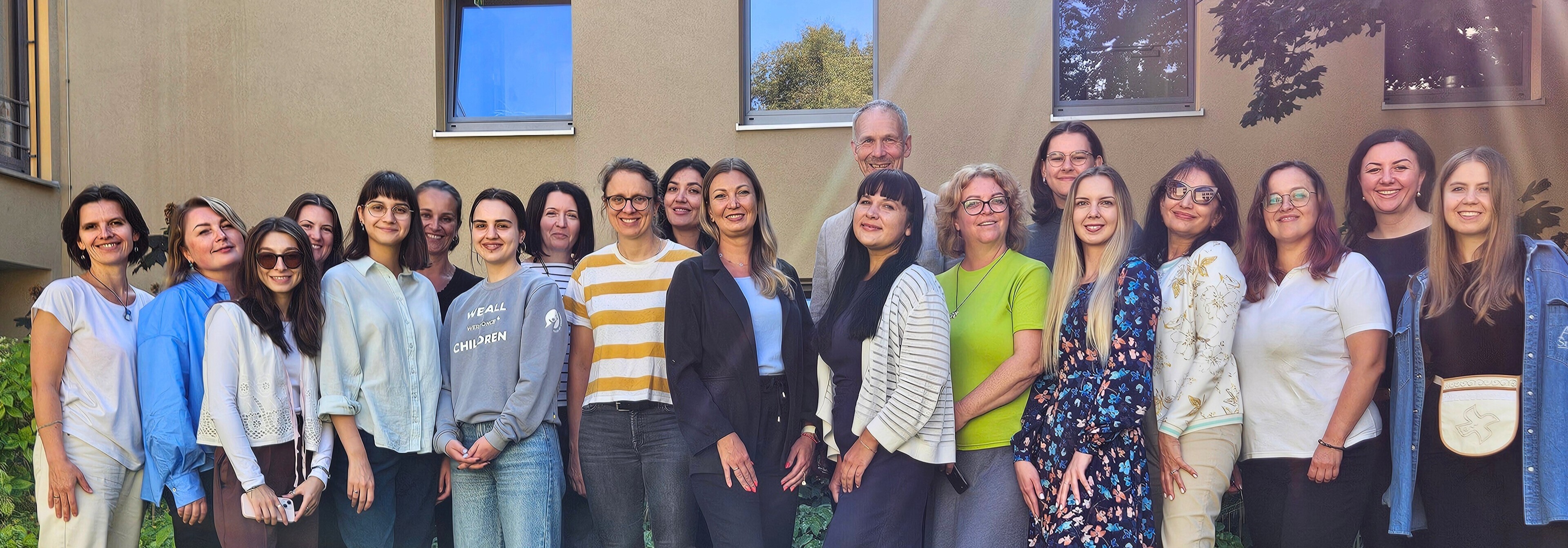
Hope for Ukraine
The war in Ukraine also has invisible consequences: psychological stress. Constant threats, loss of security, and the trauma of everyday life marked by drone and missile attacks shape the lives of people in Ukraine. To provide support here, the NaDiya hospital partnership was launched in 2023. “NaDiya” means hope – and that is exactly what the project promotes: hope for stability, resilience, and a future. After establishing initial psychosocial care structures, the second phase of the project is now focusing on the mental health of children and young people in Ukraine.
„There are already some services available for wounded soldiers, but there is a significant lack of services for traumatized children.“ - Prof. em. Dr. phil. Cornelia Kricheldorff, Former Director of the Institute for Applied Research at the Catholic University Freiburg
A seminar day in Freiburg
September 2025. Fifteen psychologists, social workers, and psychotherapists have traveled from Ukraine to Freiburg. The journey took them over 24 hours. Oksana M. says that she checks her cell phone every ten minutes to see how her children are doing. Other participants work on their laptops during the breaks in parallel with the seminar, because their responsibilities do not stop.
But for five days, the seminar room at the Catholic University of Applied Sciences in Freiburg is not only a place of learning, but also a place of tranquility. Here, they are taking part in further training in trauma-focused cognitive behavioral therapy, a proven method for treating post-traumatic stress disorder in children and adolescents. However, the participants are not only learning new approaches for their work, but also dealing with their own mental health.
One participant openly admits that she herself noticed elevated levels when filling out a stress questionnaire. That is why, in addition to specialist knowledge, self-care is also a central focus of the training program. Only when professionals reflect on their own stress levels can they be there for others in the long term.
“We used to call it a ‘course’—now we tend to refer to it as a retreat,” says Dr. Halyna Levkiv, project coordinator at the Catholic University Freiburg. “They come here and have just these six days without alarms, without bombs. They don't completely unwind, but when they go home, I have made many friends. They write: ‘Thanks to this project, we may have survived.’”

Deborah Kaiser, child and adolescent psychotherapist at the University Medical Center Freiburg, and Katja Meyer, child and adolescent psychotherapist at the University Medical Center Freiburg, during further training in trauma-focused cognitive behavioral therapy.
Effects beyond the seminar
Feedback from the first phase of the project illustrates how practical the lessons learned are. One psychotherapist reports: “When we have to take the children to the bunker, we bring the art therapy materials with us.”
The hospital partnership between the Catholic University Freiburg, the University Medical Center Freiburg, the Ukrainian Catholic University in Lviv, and many other Ukrainian institutions is making a lasting contribution to mental health in Ukraine. Prof. Cornelia Kricheldorff, who has been involved in Ukraine for many years, and Prof. Claus Muke, project manager at the Catholic University of Applied Sciences Freiburg, emphasize the importance of cooperation on an equal footing: content, concepts, and formats are developed jointly with Ukrainian partners.
The experience gained in this hospital partnership is also of great importance in Germany. The content of NaDiya is incorporated into university teaching and interdisciplinary formats, among other things. “Shortly after the full-scale invasion began, Freiburg took in 100 children from eastern Ukraine,” reports Prof. Christian Fleischhaker, acting medical director of the Clinic for Psychiatry, Psychotherapy, and Psychosomatics in Childhood and Adolescence at the University Medical Center Freiburg. “The exchange through the project is highly informative for us.”
The stress management methods taught in the project are universally applicable and are already being introduced in German institutions that work with mentally distressed children, adolescents, and families. The feedback from Freiburg is clear: “We need this here too.”
Quick Facts
Topic: Mental Health
Duration: 1st term: April 2023 – September 2024, 2nd term: since November 2024
Volume: 1,2 Mio. Euro
Partners: Ukrainische Katholische Universität Lwiw und viele weitere ukrainische Institutionen in der Westukraine
Partner organisations in Germany: Katholische Hochschule Freiburg, Universitätsklinikum Freiburg